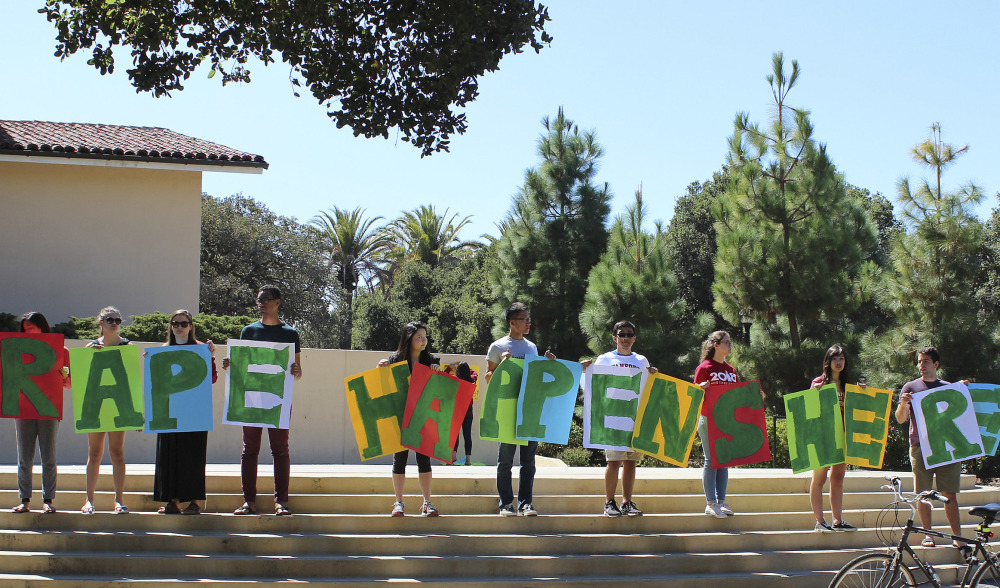September is the loveliest, most dangerous month in our coastal Maine town.
The afternoon light is golden. The tomatoes are finally ripe. The tourists are finally gone. And the students are back.
Ours is a college town, and this is the season of packed vehicles pulling up to dorms and parents unloading mini fridges, bright comforters and even brighter futures. When the maples burst into flame, cheering alums pack the football stadium, and the air is scented with ripe apples and wood smoke.
It’s known as The Red Zone, and not because of the foliage.
In ours, as well as college towns across the country, the first weeks of the semester are when the majority of ambulance rides from campus to local hospitals for alcohol poisoning will take place. This is when the majority of sexual assaults will occur. We know the numbers: Nationally, a Washington Post/Kaiser Family Foundation survey found that one in five college women will experience some form of sexual assault before graduating. Over half of these assaults will occur between August and November, National Institute of Justice researchers report.
Yet for all the hand-wringing about the epidemic of sexual assaults sweeping campuses, parents and educators have done precious little to get out in front of this issue. According to a recent study from the Harvard Graduate School of Education, 70 percent of the 18- to 25-year-olds surveyed wish they’d received more information from their parents about the emotional aspects of a romantic relationship, and 65 percent wish they could have discussed it in school.
“My students can talk about love forever,” said one high school teacher from the Harvard study who includes a section on romantic love in his English class. “They’re much more present, thoughtful and available to themselves when they talk about love.”
Yet regardless of their desire and capacity for these conversations, we adults fail to find the space for them. Sex ed in our country is woefully inadequate: Fewer than half the states mandate it, while only 20 require that it be “medically, factually or technically accurate.” Without a national curriculum for sex ed, we focus on disaster prevention: avoiding pregnancy and sexually transmitted diseases. And those assigned to teach it? “Untrained, unsupported or unqualified teachers are seeking to guide young people in one of the most consequential, subtle, wonderful, treacherous areas of their lives,” the Harvard researchers assert.
Sadly, it’s no better at home. I have been astonished by my peers’ squeamishness discussing the realities of the sexual culture our young people navigate. When Peggy Orenstein’s excellent, unflinching book “Girls and Sex” came out last year, I told everyone I knew to read it – with their daughters. My suggestion was mostly met with reluctant excuses.
“Ooh, I know I should but … do I really want to know?” more than a few parents replied.
Yes, you do. We remain ignorant at our daughters’ — and sons’ — peril. Among the more chilling revelations in Orenstein’s book: the prevalence and accessibility of pornography. An estimated 40 percent of children ages 10 to 17 have been exposed to internet porn (many accidently), and by the time they reach college an estimated 90 percent of men and a third of women have viewed porn online.
What’s more, Orenstein reports, porn is where many young people go to learn about sex. Not the basic biology of reproduction or facts about birth control: They turn to porn for the how-to, for that head-scratching moment when someone refers to something they’ve never heard of.
So, yes: our young people are turning to a $97 billion industry that overwhelmingly depicts violent, degrading sex acts against women for information about sexual relationships. Combine that with a booze-fueled hookup culture, and you can see where the statistics are coming from.
What do we do? Nationally, one presidential administration threatened to withhold federal funds from colleges that failed to punish rapists. The current administration appears poised to rescind that policy as well as to increase the standard of proof for victims. Neither approach does anything to prevent rape.
On campuses, sexual assault prevention is a standard part of freshman orientation, along with events about consent and bystander intervention. But if we’re going to change the culture of sexuality, we need to have those awkward, honest conversations with young people sooner rather than later. Because long before they arrive at college they are sexually aware, if not sexually active, beings. They are hungry to talk about it.
And move-in day is too late to start.
Maria Padian is a resident of Brunswick and author of four young adult novels; her latest, “Wrecked,” is a narrative of a college student’s sexual assault and its repercussions across campus.
Send questions/comments to the editors.



Success. Please wait for the page to reload. If the page does not reload within 5 seconds, please refresh the page.
Enter your email and password to access comments.
Hi, to comment on stories you must . This profile is in addition to your subscription and website login.
Already have a commenting profile? .
Invalid username/password.
Please check your email to confirm and complete your registration.
Only subscribers are eligible to post comments. Please subscribe or login first for digital access. Here’s why.
Use the form below to reset your password. When you've submitted your account email, we will send an email with a reset code.